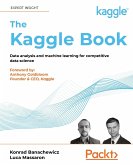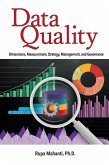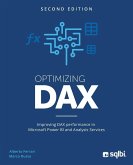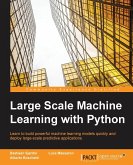Juliane Jarke, Bianca Prietl, Simon Egbert, Yana Boeva, Hendrik HeuerMethods, Interactions, and Politics
Algorithmic Regimes
Methods, Interactions, and Politics
Herausgeber: Jarke, Juliane; Egbert, Simon; Prietl, Bianca
Juliane Jarke, Bianca Prietl, Simon Egbert, Yana Boeva, Hendrik HeuerMethods, Interactions, and Politics
Algorithmic Regimes
Methods, Interactions, and Politics
Herausgeber: Jarke, Juliane; Egbert, Simon; Prietl, Bianca
- Gebundenes Buch
- Merkliste
- Auf die Merkliste
- Bewerten Bewerten
- Teilen
- Produkt teilen
- Produkterinnerung
- Produkterinnerung
Across sixteen chapters, the volume offers a diverse collection of contributions along three perspectives on algorithmic regimes: the methods necessary to research and design algorithmic regimes, the ways in which algorithmic regimes reconfigure sociotechnical interactions, and the politics engrained in algorithmic regimes.
Andere Kunden interessierten sich auch für
![Responsible Analytics and Data Mining in Education Responsible Analytics and Data Mining in Education]() Responsible Analytics and Data Mining in Education58,99 €
Responsible Analytics and Data Mining in Education58,99 €![The Anthology in Digital Culture The Anthology in Digital Culture]() Giulia TaurinoThe Anthology in Digital Culture129,99 €
Giulia TaurinoThe Anthology in Digital Culture129,99 €![Responsible Analytics and Data Mining in Education Responsible Analytics and Data Mining in Education]() Responsible Analytics and Data Mining in Education168,99 €
Responsible Analytics and Data Mining in Education168,99 €![The Kaggle Book The Kaggle Book]() Konrad BanachewiczThe Kaggle Book78,99 €
Konrad BanachewiczThe Kaggle Book78,99 €![Data Quality Data Quality]() Rupa MahantiData Quality128,99 €
Rupa MahantiData Quality128,99 €![Optimizing DAX Optimizing DAX]() Alberto FerrariOptimizing DAX63,99 €
Alberto FerrariOptimizing DAX63,99 €![Large Scale Machine Learning with Python Large Scale Machine Learning with Python]() Bastiaan SjardinLarge Scale Machine Learning with Python52,99 €
Bastiaan SjardinLarge Scale Machine Learning with Python52,99 €-
-
-
Across sixteen chapters, the volume offers a diverse collection of contributions along three perspectives on algorithmic regimes: the methods necessary to research and design algorithmic regimes, the ways in which algorithmic regimes reconfigure sociotechnical interactions, and the politics engrained in algorithmic regimes.
Produktdetails
- Produktdetails
- Verlag: Routledge
- Seitenzahl: 346
- Erscheinungstermin: 26. Februar 2024
- Englisch
- Abmessung: 240mm x 161mm x 23mm
- Gewicht: 684g
- ISBN-13: 9789463728485
- ISBN-10: 9463728481
- Artikelnr.: 70005674
- Herstellerkennzeichnung
- Libri GmbH
- Europaallee 1
- 36244 Bad Hersfeld
- gpsr@libri.de
- Verlag: Routledge
- Seitenzahl: 346
- Erscheinungstermin: 26. Februar 2024
- Englisch
- Abmessung: 240mm x 161mm x 23mm
- Gewicht: 684g
- ISBN-13: 9789463728485
- ISBN-10: 9463728481
- Artikelnr.: 70005674
- Herstellerkennzeichnung
- Libri GmbH
- Europaallee 1
- 36244 Bad Hersfeld
- gpsr@libri.de
Juliane Jarke is Professor of Digital Societies at the University of Graz. Her research attends to the increasing importance of digital data and algorithmic systems in the public sector, education and for ageing populations. She received her PhD in Organisation, Work and Technology from Lancaster University and has a background in computer science, philosophy and STS. Bianca Prietl is Professor for Gender Studies with a Focus on Digitalization at University of Basel. Her main area of expertise is feminist technoscience studies, with her more recent work focusing on the interrelations of knowledge, power, and gender in the context of (digital) datafication. Simon Egbert, PhD, is a postdoc researcher at the faculty of sociology of Bielefeld University, working in the research project 'The Social Consequences of Algorithmic Forecast in Insurance, Medicine and Policing' (ERC grant agreement No. 833749). His research interests are science and technology studies, algorithm studies, sociology of testing and sociology of the future. Yana Boeva is a Postdoctoral Researcher at the Institute for Social Sciences and the Cluster of Excellence "Integrative Computational Design and Construction for Architecture (IntCDC)", University of Stuttgart. Her research explores the transformation of design, architectural practice, and different user expectations of computation and automation. Hendrik Heuer, Dr., is a senior researcher at the University of Bremen. His research focuses on Human-Computer Interaction and Machine Learning. Currently, he is working on ways to fight misinformation. He studied and worked in Bremen, Stockholm, Helsinki, and Amsterdam and was a visiting postdoctoral research fellow at Harvard University Maike Arnold is a research associate at the KRITIS research training group and the Institute of Philosophy at TU Darmstadt. Their research focuses on trust in testimony in the context of critical decision making, especially concerning critical infrastructures and in the context of the algorithmization of information technology systems.
Algorithmic Regimes: Methods
Interactions
and Politics
Knowing in Algorithmic Regimes. An Introduction
METHODS
Revisiting Transparency Efforts in Algorithmic Regimes
Understanding and Analyzing Science's Algorithmic Regimes - a Primer in Computational Science Code Studies
Sensitizing for Algorithms Foregrounding Experience in the Interpretive Study of Algorithmic Regimes
Reassembling the Black Box of Machine Learning: Of Monsters and the Reversibility of Foldings
Methods in algorithmic regimes
INTERACTIONS
Buildings in the Algorithmic Regime: Infrastructuring Processes in Computational Design
The Organization in the Loop: Exploring Organizations as Complex Elements of Algorithmic Assemblages
Algorithm-Driven Reconfigurations of Trust Regimes: An Analysis of the Potentiality of Fake News
Recommender Systems Beyond the Filter Bubble: Algorithmic Media and the Fabrication of Publics
Taking to Machines. Knowledge Production and Social Relations in the Age of Governance by Data Infrastructure
POLITICS The Politics of Data Science. Institutionalizing Algorithmic Regimes of Knowledge Production 308
Algorithmic Futures: Governmentality and Prediction Regimes
Power and resistance in the Twitter bias discourse
Making Algorithms Fair. Ethnographic Insights from Machine Learning Interventions
Commentary: The Entanglements
Failures And Uncertainties Of Algorithmic Regimes
Index.
Interactions
and Politics
Knowing in Algorithmic Regimes. An Introduction
METHODS
Revisiting Transparency Efforts in Algorithmic Regimes
Understanding and Analyzing Science's Algorithmic Regimes - a Primer in Computational Science Code Studies
Sensitizing for Algorithms Foregrounding Experience in the Interpretive Study of Algorithmic Regimes
Reassembling the Black Box of Machine Learning: Of Monsters and the Reversibility of Foldings
Methods in algorithmic regimes
INTERACTIONS
Buildings in the Algorithmic Regime: Infrastructuring Processes in Computational Design
The Organization in the Loop: Exploring Organizations as Complex Elements of Algorithmic Assemblages
Algorithm-Driven Reconfigurations of Trust Regimes: An Analysis of the Potentiality of Fake News
Recommender Systems Beyond the Filter Bubble: Algorithmic Media and the Fabrication of Publics
Taking to Machines. Knowledge Production and Social Relations in the Age of Governance by Data Infrastructure
POLITICS The Politics of Data Science. Institutionalizing Algorithmic Regimes of Knowledge Production 308
Algorithmic Futures: Governmentality and Prediction Regimes
Power and resistance in the Twitter bias discourse
Making Algorithms Fair. Ethnographic Insights from Machine Learning Interventions
Commentary: The Entanglements
Failures And Uncertainties Of Algorithmic Regimes
Index.
Algorithmic Regimes: Methods
Interactions
and Politics
Knowing in Algorithmic Regimes. An Introduction
METHODS
Revisiting Transparency Efforts in Algorithmic Regimes
Understanding and Analyzing Science's Algorithmic Regimes - a Primer in Computational Science Code Studies
Sensitizing for Algorithms Foregrounding Experience in the Interpretive Study of Algorithmic Regimes
Reassembling the Black Box of Machine Learning: Of Monsters and the Reversibility of Foldings
Methods in algorithmic regimes
INTERACTIONS
Buildings in the Algorithmic Regime: Infrastructuring Processes in Computational Design
The Organization in the Loop: Exploring Organizations as Complex Elements of Algorithmic Assemblages
Algorithm-Driven Reconfigurations of Trust Regimes: An Analysis of the Potentiality of Fake News
Recommender Systems Beyond the Filter Bubble: Algorithmic Media and the Fabrication of Publics
Taking to Machines. Knowledge Production and Social Relations in the Age of Governance by Data Infrastructure
POLITICS The Politics of Data Science. Institutionalizing Algorithmic Regimes of Knowledge Production 308
Algorithmic Futures: Governmentality and Prediction Regimes
Power and resistance in the Twitter bias discourse
Making Algorithms Fair. Ethnographic Insights from Machine Learning Interventions
Commentary: The Entanglements
Failures And Uncertainties Of Algorithmic Regimes
Index.
Interactions
and Politics
Knowing in Algorithmic Regimes. An Introduction
METHODS
Revisiting Transparency Efforts in Algorithmic Regimes
Understanding and Analyzing Science's Algorithmic Regimes - a Primer in Computational Science Code Studies
Sensitizing for Algorithms Foregrounding Experience in the Interpretive Study of Algorithmic Regimes
Reassembling the Black Box of Machine Learning: Of Monsters and the Reversibility of Foldings
Methods in algorithmic regimes
INTERACTIONS
Buildings in the Algorithmic Regime: Infrastructuring Processes in Computational Design
The Organization in the Loop: Exploring Organizations as Complex Elements of Algorithmic Assemblages
Algorithm-Driven Reconfigurations of Trust Regimes: An Analysis of the Potentiality of Fake News
Recommender Systems Beyond the Filter Bubble: Algorithmic Media and the Fabrication of Publics
Taking to Machines. Knowledge Production and Social Relations in the Age of Governance by Data Infrastructure
POLITICS The Politics of Data Science. Institutionalizing Algorithmic Regimes of Knowledge Production 308
Algorithmic Futures: Governmentality and Prediction Regimes
Power and resistance in the Twitter bias discourse
Making Algorithms Fair. Ethnographic Insights from Machine Learning Interventions
Commentary: The Entanglements
Failures And Uncertainties Of Algorithmic Regimes
Index.








